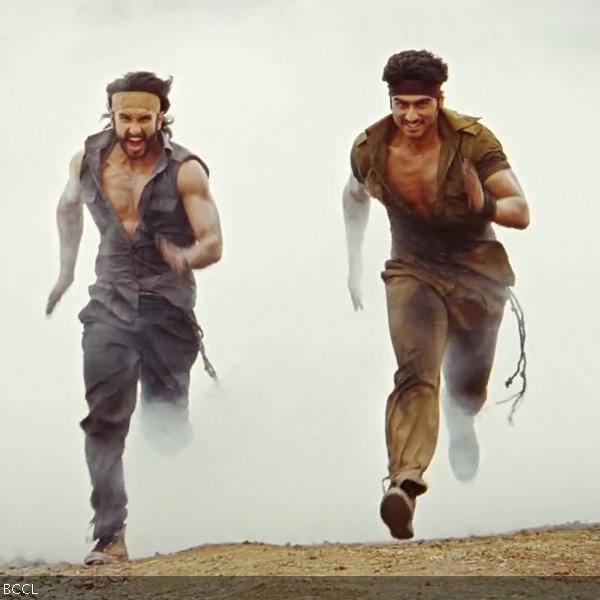Bollywood is still reeling from the ’70s. Four decades ago, the accidental flint-and-steel of actor Amitabh Bachchan and screenwriting duo Salim Khan and Javed Akhtar sparked a new Hindi cinema of hyperdramatization and the masala—genre-jumble—mass entertainer. Movies became about simplistic stories (hero-versus-villain, hero-versus-the-system), stagy dialogue and histrionics, and spectacle.
More central, however, was the larger-than-life persona of the superstar actor. Bachchan’s scowling Angry Young Man, his swaggering everyman asserted, for the first time, an Indian masculinity, and his films were formulated to provide this persona every possible exploit. The result was irresistible, if not great, cinema. Bachchan and Salim-Javed’s classic collaborations—Zanjeer (Chains; 1973), Deewaar (Wall; 1975), Sholay (Embers; 1975)—defined a post–Golden Age Bollywood and, alas, set the standard, inspiring a million lesser imitations.
Gunday (Outlaws), released Feb. 14, is a representative sample of what the ’70s did to Hindi cinema. It is grandiose, utterly bursting with bravado, but pointlessly so. It wanders aimlessly between comedy and romance and melodrama and action, fervently believing that the movie that entertains is one that is chock-full, one with a little something for everyone. The story is rife with clichés, the performances almost caricatures of the stereotypical Bollywood actor, the spectacles mindless and abundant.
Bikram and Bala are 10-year-old friends orphaned and made refugees by the 1971 Indo-Pakistani War that resulted in the formation of Bangladesh. Homeless and hungry, they begin working for a small-time arms smuggler, the first step in a looming life of crime. Soon enough, the two Indian boys are back in India, in Calcutta (present-day Kolkata), robbing coal trains.
Fast-forward 15 years, and we have Bikram (Ranveer Singh) and Bala (Arjun Kapoor), running train-side in slow motion, greased biceps and cleavage on full display, and mugging for the camera. It’s a sign of horrible things to come. Within 10 minutes, past a typical montage and voice-over, Bikram and Bala are the black-market kings of Calcutta and, also, heart-winning philanthropists. But just when it feels like things are getting going, impossibly sultry cabaret dancer Nandita (Priyanka Chopra) shows up, and the movie departs on a 45-minute male-gaze and romantic-courtship detour. Sprinkled liberally throughout are painful, over-the-top comedic routines (Gunday’s idea of humor is two dudes wearing white pants with cherry-red hearts on their bottoms), which are proof that director Ali Abbas Zafar doesn’t believe in that thing called tone.
It’s obvious that Bikram and Bala will both fall in love with Nandita, and it’s obvious what will happen to their brotherly love when they do. What’s not obvious, though, are the ludicrous plot points and gaping logical voids that lead us there. And to complicate this black-market love triangle is Satyajit Sarkar (Irrfan Khan), a purportedly sharp Assistant Commissioner of Police who is assigned to Bikram and Bala’s case.
Fundamentally, the movie is flawed because its story is pitiful: It doesn’t connect logically, let alone emotionally, tonally, or thematically. A common ailment of both the hapless and the horrendous Bollywood movie is the tendency to string together a plot by repurposing what worked for someone else before. Gunday is that not-so-rare Hindi movie which manages two-and-a-half hours of complete unoriginality. But the movie also falters for its compulsion to straddle genres, to be masala. By my count, it’s a period piece, a melodrama, an action film, a gangster flick, a buddy comedy, a romantic comedy, an all-out romance, a cops-and-robbers film, even a sexploitation flick (or, maybe, pexploitation: Singh’s and Kapoor’s burnished bosoms are always mere buttons away from liberation; and, in multiple scenes, they are topless and wrestling/fighting, once inexplicably accompanied by a Spanish-guitar soundtrack).
The word used most frequently in the film is “tevar,” which means scowl, or, more generally, attitude. Gunday makes a fabulous show of attitude. There are literally a dozen or more shots of Singh and Kapoor just standing, feet wide apart, like cowboys. There are confrontations every 10 minutes; in each, characters trade dynamite one-liners before the victorious dueler walks off in slow motion, backed by a virile soundtrack.
But—like so many other films that followed in the wake of the ’70s—this attitude is all for naught. It’s not enough for a film to conjure awesome personas, when nothing they do moves or matters. Over the last three decades, so many mainstream Hindi movies have been projects of nostalgia, or cynicism, or envy, whereby filmmakers try to summon the ineffable magic of those early entertainers. The fact that a handful have succeeded ought not overshadow the reality that thousands more have failed pathetically. As a new breed of filmmakers—Farhan and Zoya Akhtar, Vishal Bhardwaj, Anurag Kashyap—have demonstrated, Hindi cinema can do better by trying something new, something else. That’s the attitude Bollywood really needs.
In addition to FunAsia Richardson, Gunday is playing at Hollywood Theaters, 8505 Walton Blvd., Irving, TX 75063.





